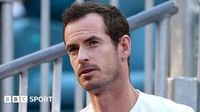Andy Murray, the three-time Grand Slam champion and former world number one, has made it clear that he intends to keep his four children away from social media until they are much older. The 38-year-old, who retired from professional tennis in August 2024, expressed concerns about the damaging impact of social media platforms on young users, especially in light of the continued abuse athletes face online.
Murray’s comments come on the heels of British tennis player Katie Boulter’s candid interview with BBC Sport, where she revealed the scale of vile and hurtful social media abuse she has endured, including death threats. This revelation has sparked renewed calls for action to protect athletes from toxic online environments.
“I think it’s positive any time anyone can speak out about it. It’s great that [Katie] talked about it,” Murray told BBC Sport. “Athletes across all sports have been discussing this for a long time, but it hasn’t really changed. Hopefully something can get done soon.”
Despite the long-standing nature of the problem, Murray admitted that finding a solution is complicated. “If I’m being honest I don’t know. Me and my wife are trying to keep our children off social media until they are much older, because I think it can be pretty damaging,” he said. His children range in age from four to nine, and many social media platforms require users to be at least 13 years old, underscoring his caution.
The former Wimbledon champion also highlighted the complexity of responsibility in tackling online abuse. “I don’t know whose responsibility it is, I don’t know if the government needs to do more to tackle it, or [X owner] Elon Musk and people like that can do more to stop these messages getting through to individuals,” Murray said. “I don’t mean just athletes, but then you get into the whole debate around free speech and it’s a difficult one.”
Data from a 2024 season-wide report by data science firm Signify, the International Tennis Federation (ITF), and the Women’s Tennis Association (WTA) revealed that approximately 8,000 abusive, violent, or threatening messages were sent publicly to 458 tennis players through social media. This alarming statistic underscores the scale of the problem faced by professional athletes.
Following Boulter’s revelations, fellow tennis players have demanded more stringent measures, including calls for identity verification on social media platforms to curb anonymous abuse. Similarly, several members of the England women’s football team announced plans to give up social media for their upcoming European Championship defense in Switzerland, highlighting the pervasive nature of online harassment in sport.
Murray also acknowledged the role athletes themselves can play in mitigating the impact of abuse. “Athletes could help themselves by trying to avoid looking at the comments and going on our phones immediately after matches,” he said, but emphasized that the burden should not rest solely on the players.
Former British tennis player Naomi Broady, 35, also shared her experiences with social media abuse, telling BBC Radio 5 Live, “I’ve seen the worst of trolling and after I had children, I don’t show their faces any more.” This sentiment resonates with Murray’s protective stance regarding his own family.
In addition to speaking out on social media abuse, Murray was present at an event in Surrey marking the completion of the Lawn Tennis Association’s (LTA) Park Tennis Project. This initiative, backed by over £45 million of investment from the government and the LTA Tennis Foundation, has refurbished more than 3,000 tennis courts across 1,000 parks in England, Scotland, and Wales—over half of which are located in areas of higher social deprivation.
“In my local area when I was growing up, a lot of the courts were derelict, with the nets broken and weeds growing out of the court, and it’s a shame,” Murray reflected. “It’s great the LTA has invested a huge amount of money and refurbished courts up and down the country. It gives more kids a chance to play tennis but in nice surroundings as well.” He expressed hope that a similar project focusing on covered courts would be the next step, helping children continue playing tennis through the winter months.
Looking ahead to Wimbledon, which starts on Monday, June 30, 2025, Murray expressed confidence in British number one Jack Draper, who will enter the tournament as the fourth seed. “He has obviously shot up the rankings and had some amazing wins,” Murray noted. “It will obviously be a little bit different this year coming in as a top seed but he’ll deal with it well. He’s played in difficult environments and under pressure before, and I’m sure he’ll cope with it well.”
Despite his ongoing involvement in tennis, including coaching Novak Djokovic earlier this year until their partnership ended in May, Murray has no current plans to attend Wimbledon. “I’m not missing [tennis] yet. Maybe when Wimbledon starts I might feel differently,” he said. “I have got no plans to go. Maybe if there was a British player in the final or something I might go along to watch, but I’m not planning on going.”
In recognition of his contributions to the sport, the All England Club confirmed plans to erect a statue of Murray at the Wimbledon grounds by 2027, a testament to his enduring legacy in British tennis.
As social media abuse continues to cast a shadow over professional sports, voices like Andy Murray’s highlight both the personal impact and the urgent need for collective action. While the solutions remain complex, the dialogue sparked by athletes and supported by emerging government regulations—such as the phased introduction of the Online Safety Act—may pave the way for safer digital spaces for athletes and young fans alike.



